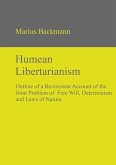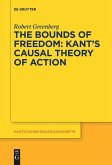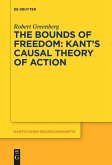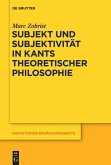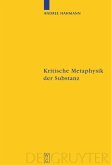In the present-day debate on free will, Kant's theory of freedom has been dismissed as bad metaphysics. This however leaves decisive questions partially unanswered, namely 1. To what concept of freedom does Kant lay claim? 2. What functions are ascribed to it? 3. What proof does Kant advance to justify it? The author demonstrates that Kant's theory has not been adequately represented in all three points, and resumes the negotiation about its systematic validity. Bojanowski demonstrates why the practice of morality cannot dispense with Kant's concept of autonomy as absolute freedom, and on the basis of Kant's epistemic critique he defends this concept against a deterministic moral scepticism. In conclusion, he demonstrates why this concept does not fail when faced with the possibility of morally evil acts, but that in fact talking about morally evil acts is not possible without it.
In der gegenwärtigen Debatte um die Willensfreiheit ist Kants Freiheitstheorie zu den Akten schlechter Metaphysik gelegt worden. Dabei sind entscheidende Fragen nach wie vor nicht zureichend geklärt: 1. Welchen Freiheitsbegriff nimmt Kant in Anspruch? 2. Welche Funktion kommt diesem Begriff zu? 3. Welchen Beweis erbringt Kant zu seiner Rechtfertigung? Der Autor weist nach, dass Kants Theorie in allen drei Punkten unangemessen repräsentiert worden ist und nimmt die Verhandlungen über ihre systematische Gültigkeit wieder auf.
Bojanowski zeigt, warum eine bestimmte Form moralischer Praxis nicht ohne Kants Begriff der Autonomie als absoluter Freiheit auskommt; er verteidigt diesen Begriff auf der Grundlage von Kants Erkenntniskritik gegen deterministische Moralskepsis. Abschließend erklärt er, warum dieser Begriff nicht an der Möglichkeit moralisch böser Handlungen scheitert, sondern die Rede von moralisch bösen Handlungen erst ermöglicht.
Hinweis: Dieser Artikel kann nur an eine deutsche Lieferadresse ausgeliefert werden.
In der gegenwärtigen Debatte um die Willensfreiheit ist Kants Freiheitstheorie zu den Akten schlechter Metaphysik gelegt worden. Dabei sind entscheidende Fragen nach wie vor nicht zureichend geklärt: 1. Welchen Freiheitsbegriff nimmt Kant in Anspruch? 2. Welche Funktion kommt diesem Begriff zu? 3. Welchen Beweis erbringt Kant zu seiner Rechtfertigung? Der Autor weist nach, dass Kants Theorie in allen drei Punkten unangemessen repräsentiert worden ist und nimmt die Verhandlungen über ihre systematische Gültigkeit wieder auf.
Bojanowski zeigt, warum eine bestimmte Form moralischer Praxis nicht ohne Kants Begriff der Autonomie als absoluter Freiheit auskommt; er verteidigt diesen Begriff auf der Grundlage von Kants Erkenntniskritik gegen deterministische Moralskepsis. Abschließend erklärt er, warum dieser Begriff nicht an der Möglichkeit moralisch böser Handlungen scheitert, sondern die Rede von moralisch bösen Handlungen erst ermöglicht.
Hinweis: Dieser Artikel kann nur an eine deutsche Lieferadresse ausgeliefert werden.



